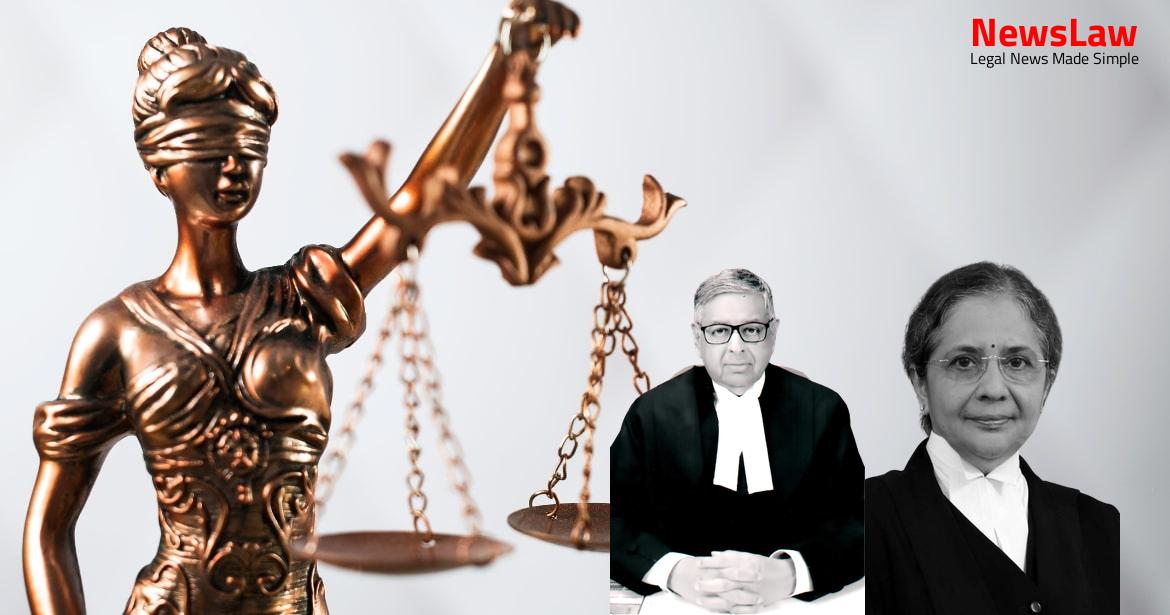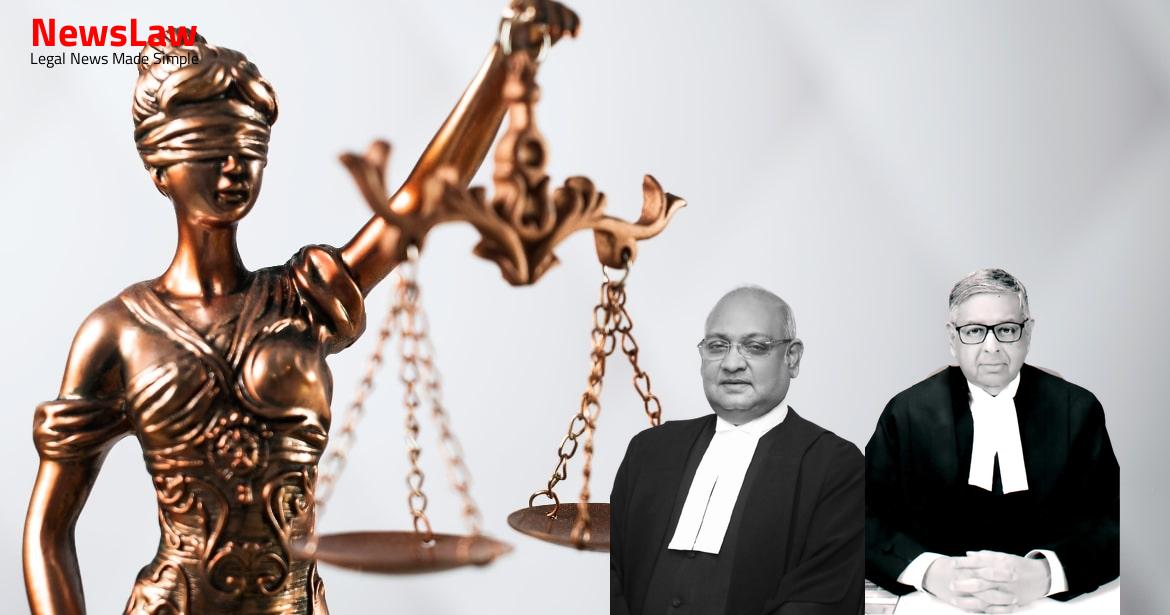In this appeal, the appellant State of Orissa has essentially contended that the High Court was not justified in issuing directions contrary to the applicable regulations, which rule out pensionary rights to the employees of the Board in specific terms; and when the provisions contained in the regulations were neither under challenge nor were declared invalid. Incorporation of the Board.- (1) The State Government with effect from such date as they may by notification appoint in this behalf, shall establish for the purpose of this Act a Board to be called the Orissa Khadi and Village Industries Board. In exercise of the powers so vested under Section 36 of the Act of 1955, the Board has made the Orissa Khadi and Village Industries Board Regulations, 1960 providing for general conditions of service of its staff, remuneration, allowances, grant of leave, retirement benefits etc. General conditions of service.-
Also Read: https://newslaw.in/case-type/civil/courts-analysis-on-bona-fide-requirement-in-eviction-petitions/
Unless otherwise provided in these regulations, the rules in the Orissa Service Code, Volume I with all its Appendices, except Appendices 1 to 4, 8 and 12, as amended from time to time by the Government shall apply to the 4 employees of the Board mutatis mutandis. Shorn of unnecessary 5 details, it could be noticed that from 06.10.1982 onwards, various proposals were mooted by the Board for providing pensionary benefits to its employees and requests were also made to the State Government to amend the Regulations of 1960 in this regard.
Thereafter, on 18.12.1985, the Industries Department, Government of Orissa sought for certain information from the Board as regards the annual requirement of funds if pension was paid to the employees of the Board and as to whether the amount required for payment of pension was more or less in comparison to Employees’ Provident Fund amount as also the details of the employees to be retired in the coming 5 years and the amount required for payment of pension to them. Thereafter, on 30.04.1993, the Board informed the Handicraft and Cottage Industries Department the total amount of accumulation, as indicated by the Regional Provident Fund Commissioner and requested to take up the matter with the Government and followed it up on 19.08.1993, with a request to the Department to expedite the matter. After the aforesaid communications, the Handicraft and Cottage Industries Department, in its communication dated 26.10.1994, indicated the anomalies which were likely to result if the pensionary benefits to the employees of the Board were allowed with effect from 01.04.1976 and suggested that Regulation 52 be suitably revised so that the date of implementation of the pension scheme would be decided by the Government instead of the Board. Thereafter, on 06.10.1995, the Deputy Secretary, Handicraft and Cottage Industries Department made a request to the Accountant General 8 (A&E), Orissa to examine the proposal for introduction of pension scheme and to send his comments to the Finance Department, while stating that there will be no extra financial burden on the Government if the pension scheme was made applicable to the Board’s employees with effect from 01.04.1976. However, by way of the letter dated 31.07.1996, the Industries Department informed the Board that the proposal for introduction of pension scheme for its employees had not been agreed to by the Finance Department for a variety of reasons, including that: (a) earlier, by the letter dated 18.12.1992, the pension scheme was proposed to be introduced with effect from 01.04.1985 but subsequently, the same was revised to be effective from 01.04.1976; (b) giving retrospective effect to pension scheme was rare and it would create administrative and financial complications in future; (c) the employees of the Board who had retired prior to 01.04.1976 will also claim pensionary benefits; and (d) all other Corporations/Institutions/Bodies of the State will agitate for pensionary benefits retrospectively, which would land the Government in administrative and financial trouble.
Thereafter, on 20.07.2001, the Board wrote a letter to the Industries Department giving justification for introducing the pension scheme in the manner that the requirement of funds to meet the pensionary scheme will be Rs. However, in view of the pendency of other writ petition, the High Court provided that the claim of the said petitioners will be subject to the result of the other writ petition filed by the employees who were in service. ” Even after re-examination of the matter pursuant to the directions aforesaid, the Finance Department observed that the State Government could not bear the liabilities in implementing the pension scheme for the 11 employees of the Board and this was communicated to the Board by the Industries Department, by way of its letter dated 14.12.2009, in the following terms: – “In inviting a reference to your letter No 2128 dated 12.05.2009 on the above subject, I am directed to say that after detail examination Finance Department have been pleased to observe that State Government cannot bear the liabilities in implementing a pension scheme for the OK & VI Board.” 2 make regulation under Section 36(2) of the said Act introducing pension scheme as per the Resolution of the Orissa Khadi and Village Industries Board dated 10.02.2009.
Also Read: https://newslaw.in/case-type/criminal/analysis-of-evidence-and-courts-ruling/
The learned Single Judge took note of the exchange of communications as above noticed and deduced that the State Government was desirous of extending the benefit to the Board ’ s employees but, ultimately the proposition was rejected only on the ground that the State Government could not bear the liabilities of pension scheme for the Board. The learned Single Judge also observed that the Board is a part and parcel of the State Government when all service rules of the State Government employees were adopted and, therefore, it was a moral duty of the opposite parties to enact the provisions for providing pensionary benefits to the employees of the Board. The Division Bench of the High Court observed that the direction of the learned Single Judge was only advisory in nature and the same was in the welfare of the employees of the Board; and the State Government shall honour the same while keeping in view the interest of the retired employees in terms of the mandate of Article 41 of the Directive Principles of State Policy by discharging its constitutional obligations towards aged persons who have 14 served the State through the Board. Perusal of the different provisions of the Act, 1955, Rule, 1956 and Regulation, 1960 framed thereunder by the Government leaves no manner of doubt that the real control, authority of the Board rests with the Industries Department of the Government, in other words the Board is under the direct control of the State Government and is totally dependant on the Government for running its administration and in carrying out its activities including finance.
To discharge such functions, programmes have been drawn by the Board with the sanction of the State Government and therefore, the State Government has all pervasive control over the Board and got power to frame Rules under Section 35 of the Act, 1955. Admittedly, when all conditions of service of the State Government employees are applicable to the Board employees, refusal to extend the pensionary scheme to such employees of the Board, in our considered view, amounts to discrimination and violative of Articles 14 and 16 of the Constitution of India. The State Government shall honour such advisory note keeping in view that the interest of the retired employees shall be taken care of by the State Government as mandated under Article 41 of the directive principles of the State policy by discharging its constitutional obligations towards aged persons who have served the State through Board, as the State has decentralized its power and functions through its instrumentalities such as the Board and other statutory Corporation for good governance of the people under the Constitution of India. Before proceeding further, it may be noticed that while entertaining the petition seeking leave to appeal in this matter, on 11.04.2014, this Court stayed the operation of the impugned judgment and order of the High Court; and on 07.09.2015, while granting leave to 16 appeal, the interim order dated 11.04.2014 was continued. Learned counsel has yet further submitted that the directions of the learned Single Judge, as approved by the Division Bench, without deliberating on Regulation 52 as also the other provisions in the Regulations of 1960 including those contained in Regulations 53 to 56, remain wholly unjustified and cannot be approved.
Learned counsel has further submitted that the Division Bench of the High Court, although consciously took note of the stipulations of Regulation 52 and observed that the directions of the learned Single Judge were only advisory in nature but then, proceeded to make further observations, which are practically of issuing mandamus to the State Government to amend the Regulations.
Learned counsel has further submitted that the learned Single Judge has referred to the pension granted to the employees of the State Social Advisory Board but, has failed to notice that 50% of those expenses were borne by the Government of India. Learned senior counsel has referred to the provisions contained in the Act of 1955 and has submitted that respondent No 2 is a statutory Board with the State Government exercising absolute control over its affairs including budgetary control; and by virtue of powers under Section 36, the Regulations of 1960 were framed.
According to the learned counsel, the writ petition filed by the employees on the grounds of hostile discrimination and non-consideration of representation was rightly decided by the learned Single Judge with directions to the State Government to amend the Regulations so as to extend the pensionary benefits to the employees of the Board at par with the employees of the State Government. Learned senior counsel has vehemently argued that financial stringency cannot be a reason for denying pensionary benefits to the employees with reference to the decisions of this Court, including that in Haryana State Minor Irrigation Tubewells Corporation and Ors. It has further been submitted that other Departments of the State, as noticed by the High Court, have been granted pensionary benefits where the cadre strength is much larger and hence, any reference to financial stringency is nothing but a bogey argument of the State Government. It has also been submitted that there were 383 employees (past and present) eligible for pension with effect from 01.04.1976, out of which, between the year 1976 to the month of May, 2022, 140 employees have died; at present, the existing posts are only 210 as the Government has abolished 173 posts; and the existing staff strength is only 58 because no appointment has been made since the year 1996. Gujarat State Khadi Gramodyog Pensioners Association : 2004 SCC OnLine Guj 105, allowed the grant of pensionary benefits to the employees of Gujarat State Khadi Gramodyog Board; and the said judgement was not interfered with by this Court in SLP (Civil) CC No.1321- 1482 of 2005, which also persuaded the High Court of Orissa to grant similar reliefs by the impugned orders and in the given set of facts, the impugned orders would call for no interference. In the last, learned senior counsel has made a fervent plea that the case of the employees concerned may be sympathetically considered by this Court and for that matter, by using extraordinary powers under Article 142 of the Constitution, to render complete justice, this Court may call upon 23 the State Government to facilitate grant of pension by recommending the amendment of Regulation 52 so that the employees, who have toiled on behalf of the Board representing the State Government, would have a secured retired life. While the deputationists who come from State Government are entitled to pension and pension related benefits, the employees who are recruited by the Board have been deprived of the same even though essentially, they are discharging the State functions, as enshrined in Article 43 of the Constitution of India. According to the learned counsel, the High Court has rightly drawn analogy from Khadi Boards of different States as also from other Orissa Government institutions, where the employees are entitled to pension; and the direction for granting pension to the employees of the Board is neither unjust nor unreasonable nor unfair. The very fact of demanding pension on the part of these employees in itself is a direct challenge to the provision denying pension to them; and in the backdrop of the present case, it cannot be construed that the employees of the Orissa Khadi Board have not raised a direct grievance against the provision denying pension to them.
Also Read: https://newslaw.in/case-type/civil/validity-of-tamil-nadu-land-acquisition-acts/
It may be observed in the first place that the principles enunciated in the decisions cited by the learned counsel for respondents, that pension is neither a charity nor a bounty nor a gratuitous payment but, is earned for past services rendered; and that non-availability of financial resources cannot be a defence by the Government or any of its agencies or 26 instrumentalities in taking away vested right accrued to the employees, are neither of any doubt nor of any dispute.
Case Title: STATE OF ORISSA Vs. ORISSA KHADI AND VILLAGE INDUSTRIES BOARD KARMACHARI SANGHA (2023 INSC 247)
Case Number: C.A. No.-006944-006944 / 2015



